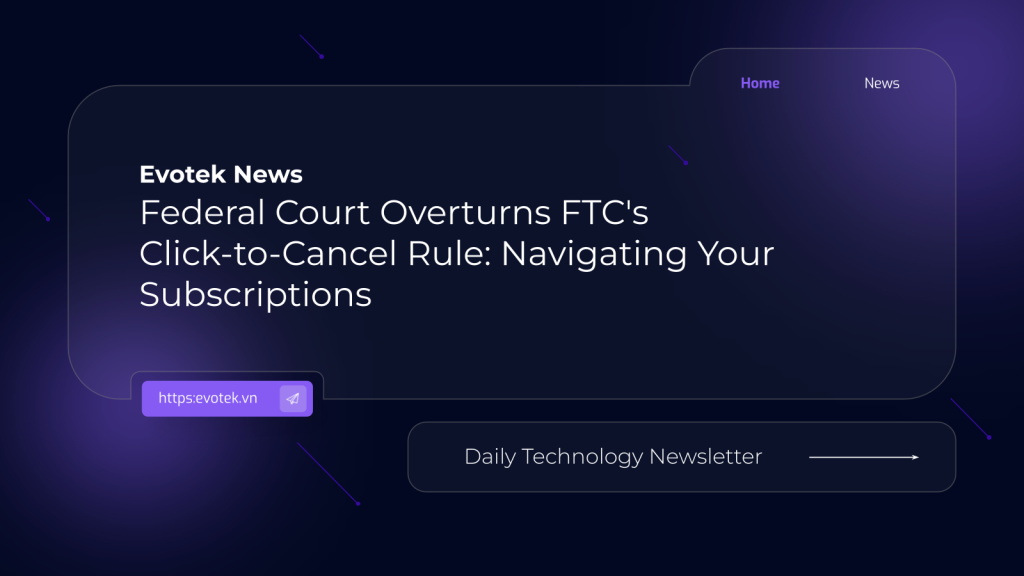A significant blow has been dealt to consumer protection efforts as a federal appeals court has halted the enforcement of a key Federal Trade Commission (FTC) regulation. This ruling blocks the “click-to-cancel” rule, which aimed to simplify the process for consumers wishing to terminate unwanted online subscriptions, memberships, and auto-renewals.
The U.S. Court of Appeals in St. Louis vacated the rule just days before its scheduled July 14 enforcement date. The court sided with several business groups, asserting that the FTC had not followed proper procedural guidelines during the rule-making process – an allegation the FTC had previously rejected. Despite the ruling, the court explicitly stated it did not “endorse the use of unfair and deceptive practices in negative option marketing.”
What the Click-to-Cancel Rule Would Have Achieved
The FTC developed this crucial rule in response to thousands of annual complaints detailing the frustrating and time-consuming obstacles consumers faced when trying to cancel recurring charges. The regulation was designed to mandate that companies make the cancellation process as straightforward as the sign-up process, requiring the same method and number of steps.
For instance, if an online subscription could be initiated with a single click, the cancellation process would also need to be a one-click action. Similarly, if a customer signed up via phone, they would be able to cancel with a phone call. Beyond ease of cancellation, the rule also stipulated that businesses must “clearly and conspicuously” disclose vital information, including recurring charge amounts, billing frequency, cancellation deadlines, and potential price increases.
When the rule initially took effect in October 2024 (with enforcement delayed until this July to allow businesses to adapt), consumer advocates were optimistic it would profoundly impact the marketplace. Shennan Kavanagh, director of litigation at the National Consumer Law Center, hailed the provisions as “common sense” measures that would prevent consumers from “unwittingly having money taken straight out of their bank accounts for services or products that they no longer wish to use.”
FTC’s Stance and Future Outlook
The FTC has not yet commented on the appeals court’s decision, with a spokesperson indicating the commission is evaluating its options. However, given that the current FTC chair is a Republican who voted against the rule last year, an appeal is considered unlikely. This aligns with the broader trend of the second Trump administration’s general disinterest in introducing new consumer protection regulations.
Erin Witte, director of consumer protection at the Consumer Federation of America and a strong proponent of the rule, expressed her disappointment on social media, highlighting the irony of corporations’ procedural complaints outweighing 16,000 consumer reports of “subscription traps.”
Navigating Subscriptions Post-Ruling: Your Self-Protection Guide
While this ruling represents a setback, there’s a silver lining: many companies, especially those with online subscription models, have already transitioned to more transparent cancellation policies. These businesses are not expected to revert to more complex interfaces immediately, as noted by Teresa Murray, consumer watchdog at U.S. PIRG.
This positive trend is partly due to state-level initiatives, with California and New York having enacted their own laws providing similar consumer protections to those envisioned by the FTC’s rule.
Regardless of your state, consumer vigilance remains paramount when signing up for any subscription or recurring purchase. U.S. PIRG offers the following essential tips:
- Read the Fine Print: Always understand the full terms and conditions before agreeing to any service.
- Uncheck Pre-Checked Boxes: Be wary of boxes that automatically opt you into additional charges or ongoing promotions. Always uncheck anything you don’t explicitly agree to.
- Calendar Your Cancellation Dates: If you subscribe for a limited time, mark the cancellation deadline on your calendar and set a reminder to avoid missing it.
- Remove Payment Information: After canceling, consider removing your credit card details from the account to prevent unintended future charges.
- Evaluate Retention Offers: Companies may offer incentives or promotional prices to keep you. If you genuinely want to continue and can afford it, consider the offer, but don’t be swayed into something you don’t need. Note the promotion end date if you accept.
Beware of “Free Trial” Offers
“Free trial” offers are particularly notorious. Often, failure to cancel by a specific date results in automatic charges for the “free” product or service, or enrollment into an ongoing subscription program. Many consumers are unaware of these conditions, as they are frequently buried in fine print or not clearly disclosed upfront.
If you fall victim to a free-trial scam, canceling can become nearly impossible, especially since the company already has your payment information (provided for shipping and handling). They can continue to bill you without your explicit consent for ongoing services.
Payment Method Matters: Credit vs. Debit
Tip: Always use a credit card for any subscriptions that bill automatically. Debit cards link directly to your bank account, making it significantly harder to dispute and get reimbursed for recurring fees if a company fails to honor your cancellation request. With a credit card, you can directly challenge fraudulent or unauthorized charges with your card issuer, offering a stronger layer of protection.
If you encounter issues canceling a subscription or membership, or believe you’ve been deceived by a free trial offer, file a complaint with the Federal Trade Commission and your state attorney general’s office.
FTC’s Amazon Prime Lawsuit Proceeds Independently
It’s important to note that this appeals court ruling does not impact the FTC’s ongoing lawsuit against Amazon, filed in June 2023. The FTC accuses Amazon of enrolling customers into its Prime program without explicit consent and then making it overly difficult to cancel – allegations Amazon denies. This case is slated for trial in late September, with a U.S. District Court Judge previously admonishing Amazon for “bad faith” conduct during discovery by withholding thousands of documents.

 日本語
日本語 한국어
한국어 Tiếng Việt
Tiếng Việt 简体中文
简体中文